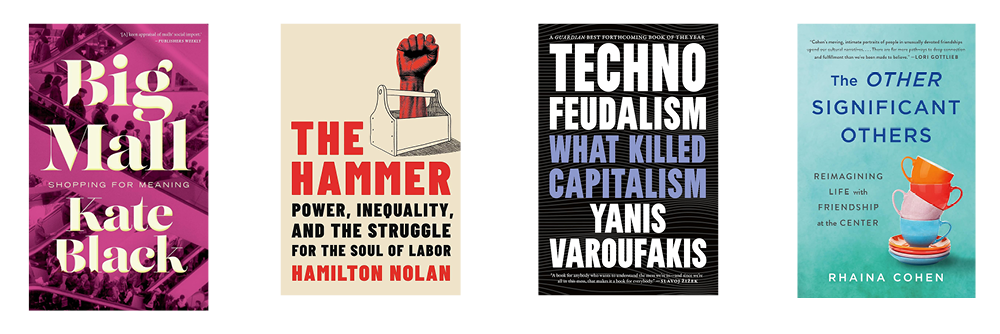February 13, 2024
Finding the right book at the right time can transform your life or your organization. We help you discover your next great read by showcasing four recently released titles each week.
The books are chosen by Porchlight's Managing Director, Sally Haldorson, and the marketing team: Dylan Schleicher, Gabbi Cisneros, and Jasmine Gonzalez. (Book descriptions are provided by the publisher unless otherwise noted.)
This week, our choices are:

Sally’s pick: Big Mall by Kate Black, Coach House Books
In less than a century, the shopping mall has morphed from a blueprint for a socialist utopia to something else entirely: a home to disaffected mallrats and depressed zoo animals, a sensory overload and consumerist trap.
Kate Black grew up in North America's largest mall: West Edmonton Mall – a mall on steroids. It’s the site of a notoriously lethal rave for teenagers, a fatal rollercoaster accident, and more than one gun-range suicide; it’s where oil field workers reap the social mobility of a boom-and-bust economy, the impossibly large structure where teens attempt to invent themselves in dark Hollister sales racks and weird horny escapades in the indoor waterpark. It’s a place people love to hate and hate to love – a site of pleasure and pain, of death and violence, of (sub)urban legend.
Can malls tell us something important about who we are? Blending a history of shopping with a story of coming-of-age in North America’s largest and strangest mall, Big Mall investigates how these structures have become the ultimate symbol of late-capitalist dread – and, surprisingly, a subversive site of hope. Ultimately, a close look at the mall reveals clues to how a good life in these times is possible.
Jasmine’s pick: The Hammer: Power, Inequality, and the Struggle for the Soul of Labor by Hamilton Nolan, Hachette Books
Inequality is America’s biggest problem. Unions are the single strongest tool that working people have to fix it. Organized labor has been in decline for decades. Yet it sits today at a moment of enormous opportunity. In the wake of the pandemic, a highly visible wave of strikes and new organizing campaigns have driven the popularity of unions to historic highs. The simmering battle inside of the labor movement over how to tap into its revolutionary potential—or allow it to be squandered—will determine the economic and social course of American life for years to come.
In chapters that span the country, Nolan shows readers the actual places where labor and politics meld. He highlights how organized labor can and does wield power effectively: a union that dominates Las Vegas and is trying to scale nationally; a successful decades-long campaign to organize California's child care workers; the human face of a surprising strike of factory workers trying to preserve their pathway to the middle class. Throughout, Nolan follows Sara Nelson, the fiery and charismatic head of the flight attendants’ union, as she struggles with how (and whether) to assert herself as a national leader, to try to fix what is broken. The Hammer draws the line from forgotten workplaces in rural West Virginia to Washington’s halls of power, and shows how labor solidarity can utterly transform American politics—if it can first transform itself.
A labor journalist for more than a decade, Nolan helped unionize his own industry. The Hammer is a urgent on-the-ground excavation of the past, present, and future of the American labor movement.
Dylan’s pick: Technofeudalism: What Killed Capitalism by Yanis Varoufakis, Melville House
Perhaps we were too distracted by the pandemic, or the endless financial crises, or the rise of TikTok. But under cover of them all, a new and more exploitative system has been taking hold. Insane sums of money that were supposed to re-float our economies after the crash of 2008 went to big tech instead. With it they funded the construction of their private cloud fiefdoms and privatized the internet.
Technofeudalism says Yanis Varoufakis, is the new power that is reshaping our lives and the world, and is the greatest current threat to the liberal individual, to our efforts to avert climate catastrophe—and to democracy itself. It also lies behind the new geopolitical tensions, especially the New Cold War between the United States and China.
Drawing on stories from Greek myth and pop culture, from Homer to Mad Men, Varoufakis explains this revolutionary transformation: how it enslaves our minds, how it rewrites the rules of global power, and, ultimately, what it will take overthrow it.
Gabbi’s pick: The Other Significant Others: Reimagining Life with Friendship at the Center by Rhaina Cohen, St. Martin’s Press
A powerful narrative on platonic partnerships and how the thrill, intimacy, and commitment we seek is often found through meaningful friendship.
Why do we assume romantic relationships are more important than friendships? What do we lose when we expect a spouse to meet all our needs? And what can we learn about commitment, love, and family from people who put deep friendship at the center of their lives?
In The Other Significant Others, NPR's Rhaina Cohen invites us into the lives of people—spanning age and religion, gender and sexuality and more—who have defied convention by choosing a friend as a life partner. Their riveting stories unsettle widespread assumptions about relationships and reveal how freeing and challenging it can be to embrace a relationship model that society doesn't recognize. And they show that orienting your world around friends isn't limited to daydreams and episodes of The Golden Girls, but actually possible in real life.
Based on years of original reporting and striking social science research, Cohen argues that we undermine romantic relationships by expecting too much of them, while we diminish friendships by expecting too little of them. At a time when many Americans are spending large stretches of their lives single, widowed or divorced, or feeling the effects of the "loneliness epidemic," The Other Significant Others challenges us to ask what we want from our relationships—not just what we’re supposed to want—and transforms how we define a fulfilling life.



